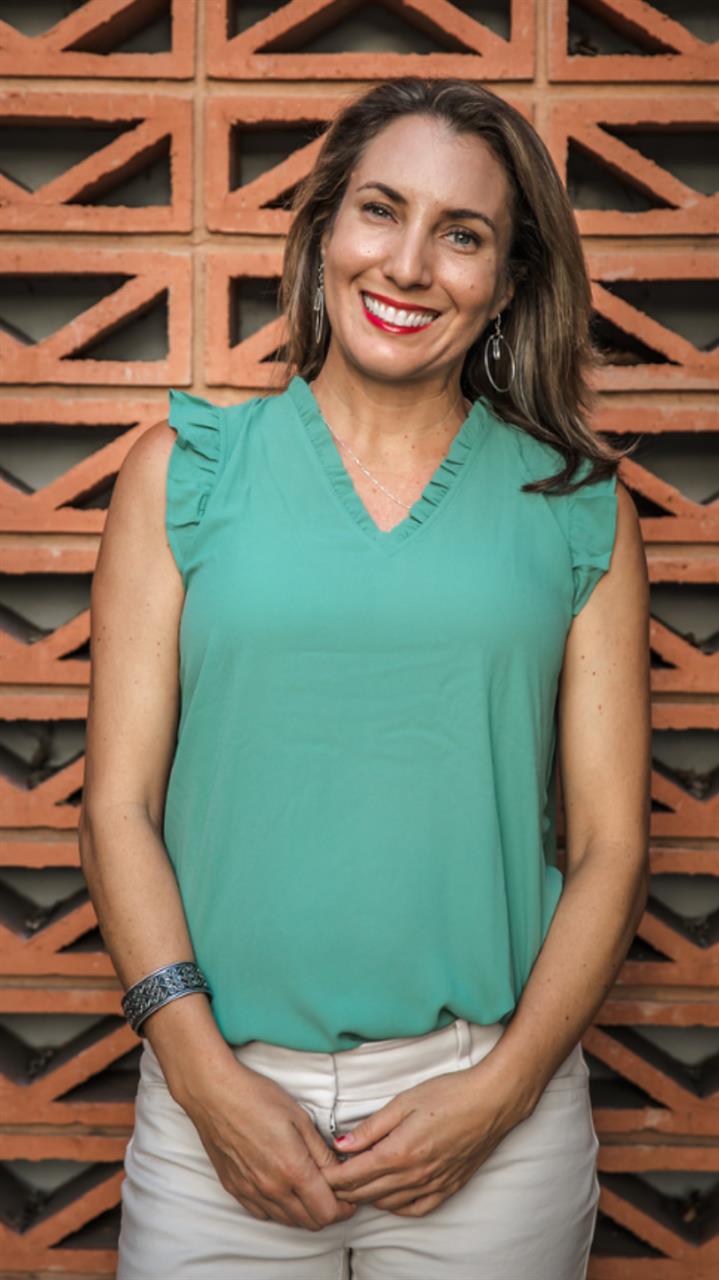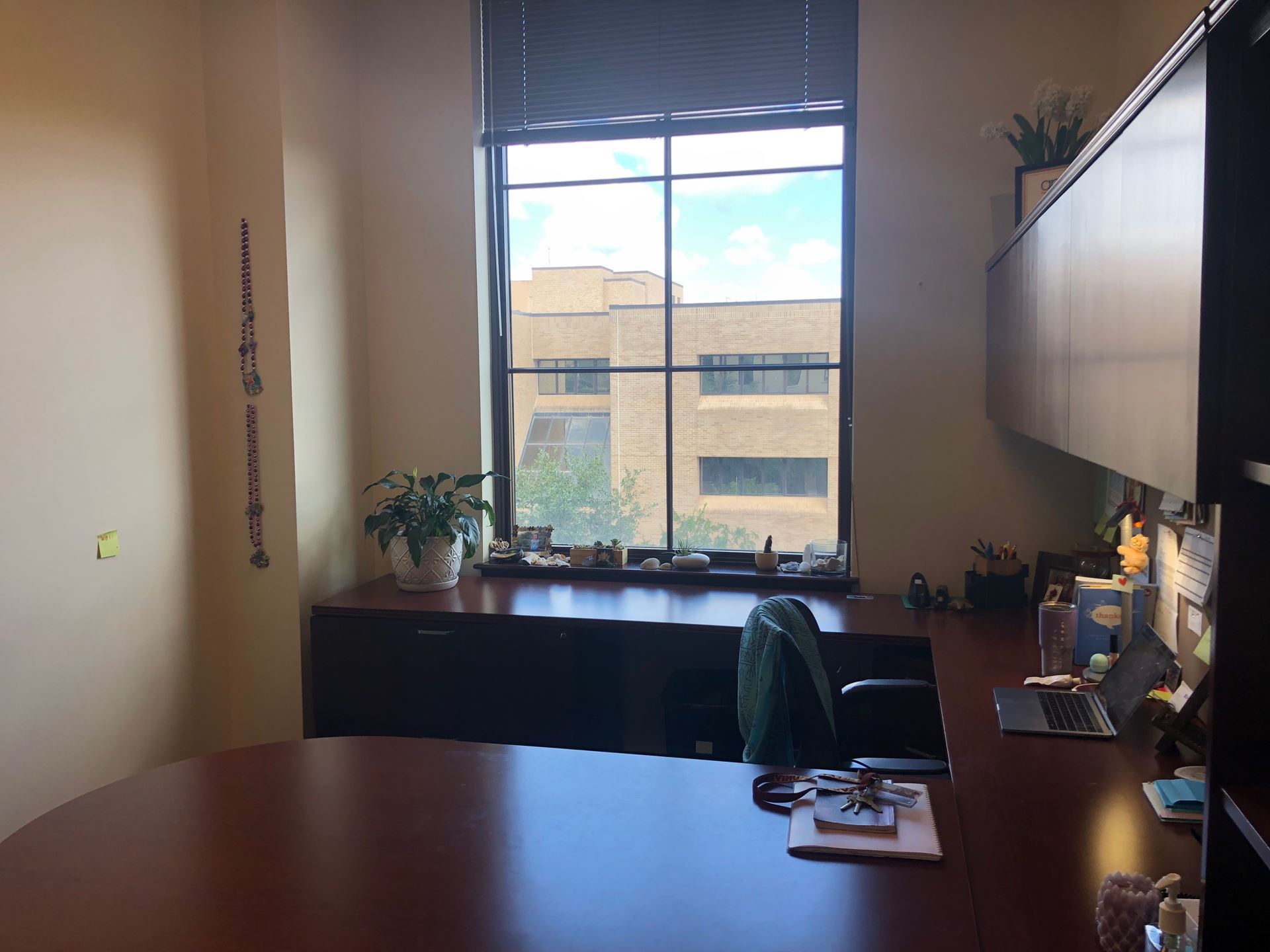 School name: Texas State University
School name: Texas State University
School locale: San Marcos, Texas: Nestled in the Texas Hill Country, sitting atop a hill, a spring-fed, crystal clear river runs through campus.
Classes you teach: All undergraduate courses, I teach both online and face-to-face sections of Psychology of Adulthood and Aging. In addition, I teach several sections of an 8-week hybrid course, Professional Seminar: Careers in Psychology.
Average class size:
- Online format of Adulthood and Aging- 25 students
- Regular section of Adulthood and Aging- 100 students
- Professional Seminar: Careers in Psychology- 30 students
What’s the best advice about teaching you’ve ever received?
I’m deeply grateful to have an ongoing, 20-year mentoring relationship with my undergraduate professor turned master’s research chair, Dr. Sam Mathews. There’s been many salient conversations over the years around crucial academic and professional decisions and turning points in my career. What should I highlight? Well, we chatted on the phone to reminisce, laugh and converse about this very question.
On teaching advice, he spoke about fostering the ability to teach and run discussions with a class of 50, one student at a time. The technique he used to make these individual connections is intentional eye contact, systematically making eye contact one student at a time in a class of 50. Also, asking open-ended, reflective questions while pausing and giving students time to think and interact. Naturally, I have modeled my teaching style after his.
He also offered insight around professional identity. Sam described how one’s professional identity is incorporated into your own, and how one informs the other. From one developmental psychologist to another, his wisdom resonated- your career path and style of teaching is a part of you and your identity. Don’t lose yourself; rather, incorporate your professional self into who you know yourself to already be.
What book or article has shaped your work as a psychology teacher?
These are not resources on teaching, but the conceptual framework for each of these books are running in the background of my mind while teaching various developmental psychology courses over the years:
Erikson, E. H. (1950). Childhood and society. New York, NY, US: W Norton & Co.
Ford, D. H., & Lerner, R. M. (1992). Developmental systems theory: An integrative approach. Thousand Oaks, CA, US: Sage Publications, Inc.
Briefly tell us about your favorite lecture topic or course to teach.
Did you know that humans are genetically predisposed to live upwards to 110-120 years?
I present to you the topic of genetic limits, one theory of primary aging that reads like the opening to a science-fiction short-story; yet, the theory is a reoccurring theme discussed in my Aging course. Genetic limits is embedded in the bio-ecological, developmental context of culture, lifestyle choices, telomeres and the notion of personal control as mechanisms of influence for aging.
The students find the theory fascinating and I so enjoy hearing their opinions on why there is still a substantial gap between the present-day average lifespan and our genetically preset potential for longevity.
Briefly describe a favorite assignment or in-class activity.
In my Careers in Psychology hybrid course, students work in groups of 2-3 based on similar career interests in various psychology subfields. Students are given discussion prompts to work through together such as:
- Identify the type of degree you need to earn, and in what type of program you would earn the degree.
- As a group, discuss anticipated challenges (e.g., academic record, performance on previous standardized tests, and financial resources) for attaining a degree and working in one of these professions
Students leave the class with more clarity and realistic expectations around the requirements and obstacles to achieving career goals in a range of subfields within the psychology profession. The group activity commonly spurs additional career-related questions that lead to important and meaningful one-on-one conversations with students outside of class.
What teaching and learning techniques work best for you?
I try to communicate with students in a way that keeps them thinking. I ask open-ended questions, solicit opinions on contradicting research findings, and request anecdotal stories of how concepts play out in real life. Typically, I have students approach me after class or in office hours sharing their opinions or stories based on class discussion. My goal is to keep them thinking long after the class meeting or semester ends. While I keep a conversational tone, I expect students to rise to the occasion and engage their intellect.
Also, there’s an abundance of social media relevant to aging; I’ll follow up a class meeting with an article or video that I post to my Twitter feed augmenting the concepts discussed in class. Again, engaging students in an alternative way that keeps them thinking.
 What’s your workspace like?
What’s your workspace like?
I prefer natural light in my office. And there’s some uniformity in how I scatter my papers that makes sense to me. I have a small collection of seashells from various beach trips that are special to me, and I dote on my plants when I need a quiet moment to reflect and be with my thoughts.
Also, I have several of my graduate texts and almost every course notebook from my master’s and doctoral classes. I have this romantic, nostalgic notion about someday sitting down and reviewing old course notes.
Three words that best describe your teaching style.
Socratic, reflective, story-driven
What is your teaching philosophy in 8 words or fewer?
Adapt studies and concepts to real world examples.
Tell us about a teaching disaster (or embarrassment) you’ve had and how you dealt with the situation.
When I was a first-year doctoral student administering my first test, there was one remaining student completing the test long after the class wrapped up. She was worried about her pending test grade, so I offered to grade it right then. Well, I had to tell her she failed miserably, and spent the next few minutes trying to calm down an inconsolable student- bordering hysterical. I made a mental note to never repeat that mistake again.
What is something your students would be surprised to learn about you?
When I began my doctorate, I was fully focused and invested in furthering my research, and carving out a research-based career in developmental psychology. My graduate assistantship package included teaching my own undergraduate class, Developmental Psychology. It quickly transformed from a work obligation to the highlight of my doctoral-training experience. Although I miss the mental stimulation that comes from science writing, I still get giddy introducing students to Erkison’s psychosocial theory, longitudinal research designs, and genetic limits!
Also, I teach Aging at 8am sharp; I think my students would be surprised to learn that I'm not a morning person.
What are you currently reading for pleasure?
I reread Gone with the Wind prior to the start of the semester.
Currently skimming Thanks: How the Science of Gratitude Can Make You Happier, and a dozen or so journal articles on positive psychology and/or aging.
What tech tool could you not live without?
Twitter, power point and my university’s LMS via mobile app.
What is your hallway chatter like? What do you talk to colleagues about most (whether or not it is related to teaching/school)?
“…that smells delicious…” and “…I have an idea to run by you for an upcoming…”
